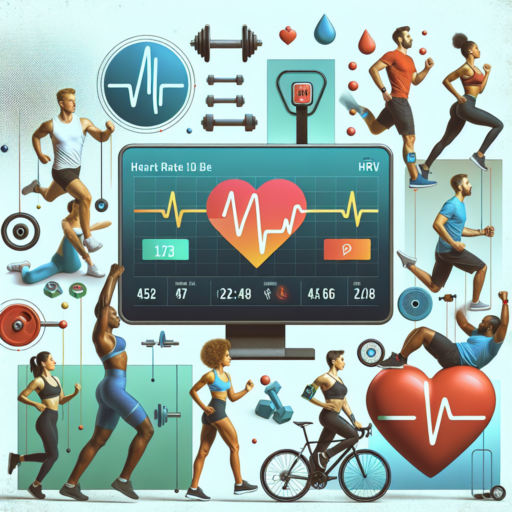Understanding Your Ideal HRV Score for Optimal Health
Identifying your ideal Heart Rate Variability (HRV) score is key to optimizing your health and wellbeing. HRV refers to the variation in time between each heartbeat, serving as a crucial indicator of your autonomic nervous system’s ability to adapt to stress and environmental factors. It’s a metric that can offer deep insights into your physiological resilience and cardiac health. However, understanding what an ‘ideal’ HRV score looks like requires a nuanced approach, considering personal health backgrounds and lifestyle factors.
What constitutes an ideal HRV score greatly varies from one individual to another. Age, fitness level, gender, and overall health status play significant roles in determining your optimal HRV range. Typically, a higher HRV indicates better cardiovascular fitness, stress resilience, and overall health. For instance, athletes often exhibit higher HRV scores compared to non-athletes, reflecting their superior cardiac efficiency and autonomic nervous system balance. Nevertheless, comparing your HRV readings with generalized charts without considering personal health specifics can lead to misinterpretations about your health status.
Furthermore, leveraging technology to monitor your HRV can be instrumental in understanding your body’s responses to various stressors and recovery patterns. Wearable fitness trackers and smartwatches are increasingly sophisticated, offering accurate HRV measurements and insights into your daily and long-term health trends. By regularly tracking your HRV, you can identify patterns, understand how your lifestyle choices impact your health, and make informed decisions to optimize your HRV score. Thus, it’s essential to view HRV tracking as a personalized journey towards optimal health, rather than chasing an arbitrary ‘ideal’ number.
The Key Factors Influencing Your HRV Score
Understanding the factors that influence your Heart Rate Variability (HRV) score is crucial for managing stress, enhancing recovery, and improving overall health. HRV measures the variations in time between each heartbeat, reflecting the activity of the autonomic nervous system (ANS). Recognizing what affects this score can help individuals tailor their lifestyle for optimal health.
Physical Activity and Exercise
One significant factor affecting HRV is physical activity and exercise. Regular, moderate exercise tends to improve HRV by enhancing the heart’s efficiency and autonomic balance. However, excessive physical strain without adequate recovery can lead to a decrease in HRV, highlighting the importance of balanced workout routines and rest days.
Sleep Quality
Sleep quality also plays a critical role in your HRV score. Both the quantity and quality of sleep can impact HRV, with poor sleep potentially leading to lower scores. Ensuring a consistent sleep schedule and optimal sleep environment can foster a higher HRV, reflecting better recovery and stress resilience.
Stress and Mental Health
Lastly, stress and mental health are vital factors influencing HRV. Chronic stress and poor mental health conditions, such as anxiety and depression, can suppress HRV scores. Techniques to manage stress and improve mental health, such as mindfulness and meditation, can enhance HRV levels, indicating a more balanced and responsive autonomic nervous system.
How to Interpret Your HRV Score for Better Well-being
Understanding your Heart Rate Variability (HRV) score is crucial for enhancing your overall well-being. HRV measures the variation in time between each heartbeat, serving as a powerful indicator of your autonomic nervous system’s capability to adapt and manage stress. A higher HRV suggests a robust, resilient system, adept at handling stressors, while a lower HRV may indicate stress, fatigue, or even health issues. Knowing how to read your HRV can empower you to make informed decisions about stress management, physical activity, and lifestyle.
To begin with, it’s fundamental to track your HRV score consistently over time rather than focusing on isolated readings. This is because HRV is influenced by a variety of factors such as activity levels, sleep quality, and even hydration, making single measurements less meaningful. By monitoring your HRV trend, you can start to notice how certain behaviors and activities affect your score. Significant deviations from your baseline HRV can serve as early warnings for overtraining, increased stress, or the need for rest.
Identifying Patterns for Optimal Health
Delving deeper into your HRV data, look for patterns that emerge in relation to your daily habits. For example, you might find that on days when you exercise, your HRV increases, signifying positive stress and recovery. Conversely, periods of little sleep or high emotional stress could correlate with lower HRV scores, highlighting areas for improvement. By drawing connections between your lifestyle choices and HRV scores, you can tailor your activities and behaviors to foster better health and resilience.
Remember, interpreting your HRV is not just about aiming for higher numbers. It’s about understanding the nuances behind the changes in your score and how they relate to your body’s responses to stress, recovery, and overall health. Engaging with your HRV data in this way encourages a more informed and proactive approach to well-being.
No se han encontrado productos.
Top Methods to Improve Your HRV Score Naturally
Improving your Heart Rate Variability (HRV) score is a direct pathway to better cardiovascular health, stress management, and overall wellness. A higher HRV score indicates a healthy, responsive cardiovascular system, while lower values may suggest stress, fatigue, or underlying health issues. The following are proven methods to enhance your HRV score naturally, aligning with both scientific research and wellness practices that encourage a harmonious balance between the sympathetic and parasympathetic nervous systems.
Consistent Physical Exercise
Regular, moderate exercise is a cornerstone in enhancing HRV. Activities such as walking, cycling, or yoga not only improve cardiovascular fitness but also promote a healthier, more variable heart rate. It is crucial, however, to balance intensity and rest, as excessive training can lead to stress, reducing HRV. Integrating varied physical activities into your weekly routine can stimulate improvements in HRV over time.
Mindfulness and Stress Reduction Techniques
Stress plays a significant role in HRV scores, with chronic stress contributing to lower readings. Employing stress reduction techniques such as meditation, deep-breathing exercises, and mindfulness can significantly improve HRV by engaging the parasympathetic nervous system and encouraging relaxation. Regular practice fosters a heightened state of calm and resilience against stressors, reflected in improved HRV scores.
Optimizing Sleep Quality
Sleep is fundamentally linked to HRV, as it is a period of deep recovery and repair for the body. Ensuring adequate, high-quality sleep on a consistent basis can markedly boost HRV. Strategies to enhance sleep quality include establishing a regular bedtime routine, reducing blue light exposure before bed, and maintaining a comfortable, serene sleep environment. Paying attention to sleep hygiene not only supports HRV but also enriches overall health and wellbeing.
The Connection Between HRV Scores and Physical Fitness
Understanding the link between Heart Rate Variability (HRV) scores and physical fitness is pivotal for athletes and fitness enthusiasts aiming to optimize their performance and health. The HRV score, a measure of the variation in time between each heartbeat, speaks volumes about one’s cardiovascular health and physical readiness. This indicator provides crucial insights into how well the body manages stress, recovers from exercise, and its overall resilience.
High HRV Scores: A Marker of Fitness. Generally, a higher HRV indicates a healthy, responsive nervous system and an adept cardiovascular system. It reflects an individual’s capacity to withstand physical stress and efficiently recover. For fitness enthusiasts, monitoring HRV can guide in tailoring training intensity, ensuring that workouts are aligned with the body’s current capability to handle stress, thereby preventing overtraining and injuries.
HRV Scores and Training Adaptation
Adapting workouts based on HRV scores can significantly impact training outcomes. This biofeedback mechanism enables the fine-tuning of training regimens, ensuring optimal stress and recovery balance. A consistent evaluation of HRV allows for the detection of how the body responds to various types of exercises and intensities, facilitating a more personalized approach to fitness.
HRV Scores: Age and Gender Norms to Be Aware Of
Understanding HRV (Heart Rate Variability) scores is crucial for monitoring overall health and wellness. HRV measures the variation in time between each heartbeat, reflecting the heart’s ability to respond to different stress levels and stimuli. It’s important to note that HRV scores can significantly vary based on age and gender, making it essential to understand these norms to accurately interpret your results.
For gender variations, studies have shown that women tend to have higher HRV scores compared to men, indicating a stronger resilience to stress and a generally more robust autonomic nervous system response. This distinction highlights the importance of gender-specific baselines when evaluating HRV data. On the other hand, age plays a critical role in determining HRV scores as well. Younger individuals typically exhibit higher HRV scores, which gradually decrease with age. This decline suggests a reduction in the autonomic nervous system’s adaptability and overall heart health over time.
To further bring clarity to these variations, it is helpful to look at age and gender norms through specific segments. For instance:
- Children and adolescents generally show the highest HRV scores, due to the high flexibility of their autonomic nervous system.
- Healthy adults between the ages of 25 and 50 years might experience a gradual decline in HRV scores, reflecting normal aging processes.
- Post-menopausal women may see a more significant drop in HRV scores, possibly due to hormonal changes affecting the autonomic nervous system.
Using Technology to Monitor and Optimize Your HRV Score
Monitoring and optimizing your Heart Rate Variability (HRV) score has become a crucial aspect of maintaining optimal wellness and performance. With the advancement of technology, individuals now have access to tools and applications that make tracking HRV scores more accessible than ever. Understanding and improving your HRV can lead to enhanced stress resilience, better cardiovascular health, and improved overall fitness. By leveraging technology, you can take proactive steps to monitor this vital health metric and make informed decisions about your lifestyle and fitness routines.
Several wearable devices and mobile applications are specifically designed to provide accurate HRV measurements. These tools collect data through sensors, analyzing heart beats and their variability to give a clear picture of your autonomic nervous system’s activity. By consistently monitoring your HRV score, you can identify patterns and factors that influence your body’s stress and recovery states. This information is invaluable for tailoring your recovery strategies, optimizing workout plans, and ensuring that your body is getting the right balance between stress and rest.
To maximize the benefits of HRV monitoring, it’s essential to combine technology with informed decision-making. Interpret your HRV scores within the context of your overall health and lifestyle. Pay attention to how variations in your score correlate with different stressors, sleep quality, and exercise intensity. With this knowledge, you can adjust your habits to improve your HRV score and, by extension, your health and well-being. High-quality sleep, mindful stress management, and regular, varied exercise are all proven strategies to boost your HRV.
Scientific Insights: What Studies Say About Ideal HRV Scores
Understanding the significance of Heart Rate Variability (HRV) scores is crucial in assessing one’s physiological resilience and stress levels. Scientific research sheds light on the range of ideal HRV scores that vary significantly across different populations, making the pursuit of a «one-size-fits-all» figure challenging. However, insights from numerous studies offer a clearer perspective on what these variabilities suggest about our health.
Key Factors Influencing HRV Scores
Research highlights that several factors contribute to the fluctuations in HRV scores, including age, fitness level, and lifestyle choices. For instance, younger individuals and those with higher physical fitness levels tend to exhibit higher HRV scores, indicative of a more responsive and healthier autonomic nervous system. Understanding these influences is critical in interpreting HRV data accurately, as personal benchmarks are more meaningful than universal standards.
What Constitutes an Ideal HRV Score?
- Awareness of individual baseline measurements is key to identifying deviations and physiological stress.
- Continuous monitoring can help in establishing a personal “ideal” range rather than comparing against a universal norm.
- It is essential to consider the impact of daily activities and stress levels on HRV scores to make informed health assessments.
The quest for an ideal HRV score is deeply personalized, with ongoing research underscoring the importance of contextualizing HRV measurements within individual lifestyle and health profiles. This nuanced approach acknowledges the complex interplay between physiological conditions and heart rate variability, offering a more accurate and beneficial understanding of personal health metrics.
Common Misconceptions About HRV Scores Debunked
Understanding Heart Rate Variability (HRV) scores can often be complex, leading to widespread misconceptions about what they truly represent and how they can be utilized to enhance our health and fitness routines. It’s crucial to debunk these myths to harness the full potential of HRV scores in tracking and improving our physiological well-being.
HRV Scores Indicate Heart Health Alone
One of the most common misconceptions is that HRV scores are exclusive indicators of heart health. Although HRV scores do provide insight into cardiac functioning, they paint a broader picture of our overall autonomic nervous system balance. This system controls our body’s unconscious actions, such as digestion and respiratory rates, and is deeply influenced by stress, sleep quality, and physical fitness. Therefore, while an important component, heart health is just a part of what HRV scores can reveal about our bodily systems.
Higher HRV Scores Always Mean Better Health
Another prevalent myth is that higher HRV scores always signify better health or fitness levels. It’s essential to understand that HRV is highly individualized; optimal scores vary greatly from one person to another and are influenced by a multitude of factors including age, genetics, and training status. What constitutes a «good» HRV score for one individual may be entirely different for another, making context and baseline measurements critical for accurate interpretation.
A Single HRV Reading Determines Your Health Status
Finally, the belief that a single HRV reading can determine your overall health status is a misunderstanding. HRV fluctuates significantly based on daily activities, stress levels, and even the time of day when measured. Consequently, consistent tracking over time provides a more accurate representation of your HRV trends and what they imply about your health and fitness. Relying solely on isolated readings without considering the broader context can lead to misinterpretations about one’s health.
Real-Life Success Stories: Improving Health Through Better HRV Scores
Across the globe, individuals are discovering the profound impact that improving their Heart Rate Variability (HRV) scores can have on their overall health and well-being. These real-life success stories highlight not just the importance of monitoring HRV but also the practical steps individuals can take to enhance it. Through dedicated efforts towards lifestyle adjustments, stress management, and consistent exercise, many have seen significant improvements in their HRV scores, leading to better health outcomes.
HRV scores, a measure of the variation in time between each heartbeat, are increasingly recognized as a crucial indicator of autonomic nervous system function and, by extension, a person’s overall health and fitness levels. A higher HRV suggests a healthy, responsive cardiovascular system, whereas lower HRV is often linked to stress, fatigue, and even various health problems.
One of the most compelling aspects of these success stories is the variety of methods individuals have used to improve their HRV scores. From embracing mindfulness and meditation to adopting a healthier diet and regular physical activity, these stories underscore the multifaceted approach needed for genuine and sustainable health transformation. Incorporating these habits not only elevates HRV but also contributes to a more balanced and energetic lifestyle.




